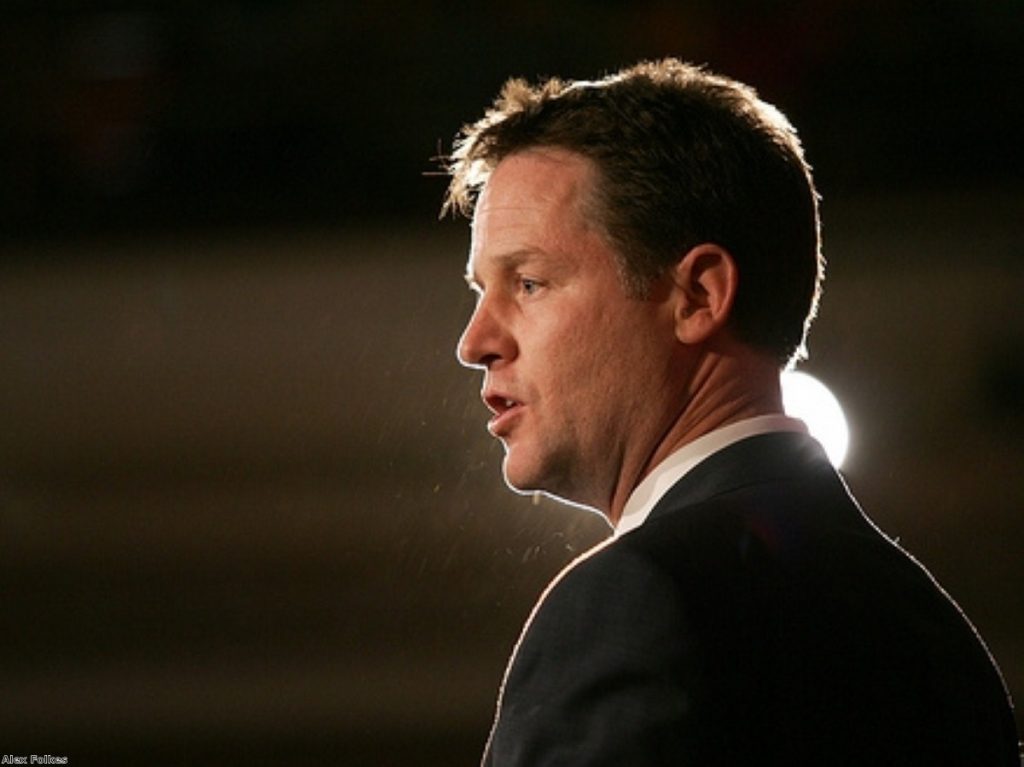Clegg heralds age of civil liberties by unveiling libel reform
By Ian Dunt
Nick Clegg heralded a new age of civil liberties today, as he continued to impress on Lib Dem voters the party’s achievements in power.
The deputy prime minister centred a major speech in London on upcoming efforts to reform Britain’s libel laws, which many activists consider a stain on Britain’s international reputation for free speech.
He also confirmed plans, reported yesterday, to expand the Freedom of Information Act to public bodies, such as educational and policing watchdogs.


Mr Clegg promised to restore civil liberties with the same “systematic ruthlessness” with which the former government took them away.
But there was confusion over the status of reforms to control orders. Mr Clegg resisted requests for more details on exactly how the law around the measure would change and insisted no final decision had been made.
That reticence muddied the waters over who was winning in the behind-the-scenes battle between him and Theresa May.
The home secretary is understood to have been convinced by the arguments of the security services and several ex-ministers that the orders were necessary to protect Britain from terrorist suspects.
But civil liberties advocates and Liberal Democrats were thought to have won the day, and the measure was expected to be replaced by a system of intensive surveillance which did not contravene fundamental aspects of the British legal tradition.
Shadow home secretary Ed Balls yesterday accused the government of “playing politics” with the issue.
“The home secretary deserves huge credit for the leadership she is showing on that,” Mr Clegg said diplomatically.
“And I will not, today, second guess the precise outcome of that review. Some people say we are taking too long to present our findings. But what is most important here is that we get this right.”
But he added: “Control Orders cannot continue in their current form. They must be replaced.
“I don’t think it’s justifiable to impose virtual house arrest without having to charge or convict someone first.”
A YouGov survey highlighted by Liberty today suggested a slim majority of the public prefer intensive surveillance to control orders.
Public ‘back surveillance over control orders’
There was considerably more detail on libel reform, which will take place in the spring.
Recent high-profile libel cases, including science writer Simon Singh’s battle against the British Chiropractic Association, convinced many lawmakers that issue was increasingly becoming one of public health and safety.
“The test of a free press is its capacity to unearth the truth, exposing charlatans and vested interests along the way,” Mr Clegg said.
“It is simply not right when academics and journalists are effectively bullied into silence by the prospect of costly legal battles with wealthy individuals and big businesses.
“Of course, individuals and organisations must be able to protect their reputations from false and damaging claims.
“But, equally, we want academics and journalists to be fearless in publishing research, not least when it relates to medical care or public safety.”
Legal experts were alarmed when US president Barack Obama signed into law a measure protecting Americans from foreign libel actions last year.
The move did not mention Britain by name, but given the UK’s reputation as a libel tourist capital of the world, there was widespread agreement that US lawmakers had the country in their sights.
“It is a farce – and an international embarrassment – that the American government has felt it necessary to legislate to protect their citizens from our libel laws,” Mr Clegg said.
“This government wants to restore our reputation for free speech. We will be publishing a draft defamation bill in the spring.
“We intend to provide a new statutory defence for those speaking out in the public interest, and to clarify the law around the existing defences of fair comment, and justification.”
The deputy prime minister expanded out from libel to promote the government’s efforts to undo much of Labour’s draconian counter-terrorism measures, including lengthy pre-charge detention and ID cards.
“My party spent years campaigning against the erosion of our civil liberties under Labour,” the Liberal Democrat leader said.
“And now, in government, we are going to turn a page on that chapter; resurrecting the liberties that have been lost; embarking on a mission to restore our great British freedoms.”












